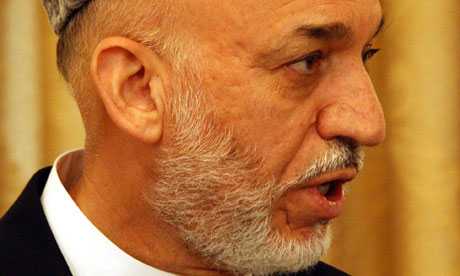US and Afghan governments make contact with Haqqani insurgents
![]()
US and Afghan governments make contact with Haqqani insurgents
Exclusive: US dealing with Haqqani clan – which has close ties to al-Qaida – through Western intermediary
Julian Borger and Declan Walsh

Both the Afghan and US governments have recently made contact with the most fearsome insurgent group in Afghanistan, the Haqqani network, the Guardian has learned.
Hamid Karzai’s government held direct talks with senior members of the Haqqani clan over the summer, according to well-placed Pakistani and Arab sources. The US contacts have been indirect, through a western intermediary, but have continued for more than a year.
The Afghan and US talks were described as extremely tentative. The Haqqani network has a reputation for ruthlessness, even by the standards of the Afghan insurgency, and has the closest ties with al-Qaida. But Kabul and Washington have come to the conclusion that they cannot be excluded if an enduring peace settlement is to be reached.
A senior Pakistani official, speaking on condition of anonymity, said “you wouldn’t be wrong” when asked whether talks involving Haqqani, Karzai and the US were taking place. But he refused to comment further, citing the sensitivity of the matter. Calls and emails soliciting comment from the US state department were unreturned by late last night.
A senior western official said the US now considers the Haqqani network to be more powerful than the Quetta Shura, the 15-man leadership council headed by the Taliban’s leader, Mullah Omar.
“The Quetta Shura is still important but not as much as people thought two years ago. Its prestige and impact have waned, and they are increasingly less important on the battlefield. Now the military threat comes from the Haqqanis,” the official said.
The twin poles of the insurgency are located at least 250 miles apart along the Durand Line, the lawless Pakistani border. The Haqqanis, who come from Khost in Afghanistan, are anchored in the Pakistani tribal area of North Waziristan. The Washington Post reported yesterday that there had been top-level contacts between Kabul and the Quetta Shura, but not the Haqqani network. Kabul and the Haqqanis have also denied any contacts. The CIA chief, Leon Panetta, said in June that he did not believe the group had any real desire for reconciliation.
However, the contacts were confirmed to the Guardian by western, Arab and Pakistani official sources, who all said the Haqqanis sense that a negotiated settlement is the most likely outcome of the conflict, which enters its 10th year today, and are anxious not to be excluded. Speaking of Sirajuddin Haqqani, who has taken over military leadership of the Haqqani group from his ailing father, Jalaluddin, a diplomat involved in the discussions said: “The ice has broken. He realises he could be a nobody if he doesn’t enter the process.”
Drawing a parallel with the Northern Irish peace process, the diplomat said: “The Haqqanis know they have to make the transition from the IRA to Sinn Féin.” According to several sources, a Haqqani delegation, including Sirajuddin’s brother and uncle, visited Kabul accompanied by senior officers from the Pakistani Inter Services Intelligence agency (ISI) – the group’s sponsor since the start of the conflict – for talks with Afghan officials.
A diplomatic source familiar with the talks said the Haqqani side had been noncommittal. “Even though they were sitting opposite each other talking, they were saying: ‘Imagine if we did have talks, what would be the political framework?'”
A source directly involved in the reconciliation process said there had also been a face-to-face meeting between Karzai and Sirajuddin Haqqani on the Afghan-Pakistan border in the spring, but this could not be confirmed. A report by Al-Jazeera television to this effect in July was strenuously denied by both sides.
The indirect contacts with the Americans have been made through a non-governmental western intermediary, who has met Haqqani representatives in Pakistan several times in the past 18 months, and who has conveyed messages to and fro.
Different diplomatic sources gave different accounts of the Haqqanis’ readiness to take part in a preliminary dialogue.
One said the relentless targeting of the Haqqani network fighters and leaders by US drones had devastated morale. “There is war-weariness on both sides. Not just in the west,” the diplomat said.
Another said the announcement by the US president, Barack Obama, that the troop drawdown would begin next July, had in turn encouraged the Haqqanis to come forward. “That conveyed a message that the Americans would not be there for ever, and they definitely were in the market for talks, and that opened a door,” the source said.
He predicted that talks with both the Haqqanis and the Quetta Shura would begin in earnest in December, after the winter snows cut the passes between Pakistan and Afghanistan and effectively end the fighting season.
In any future talks the critical demand from both Kabul and Washington would be for the Haqqanis to sever their ties to al-Qaida, whose leaders, including Osama bin Laden, are believed to be sheltering in the caves of North Waziristan.
A Pakistani official said yesterday that he believed the group was ready to make that step. “This is the end of the road for al-Qaida in Waziristan,” the official said.
Related Articles
El FMI confiesa que han matado al paciente
![]()
Puede que no se den cuenta los periodistas que deambulan como zombis , presos del jet lag,por el Tokyo International Forum
Por el camino de la dictadura
![]()
Todo se desmorona en España: El Estado del bienestar, los derechos de los trabajadores, la educación, la sanidad. (Foto: Reuters)
Las FARC anuncian la liberación del periodista francés para el próximo miércoles
![]()
Las Fuerzas Armadas Revolucionarias de Colombia (FARC) han anunciado que el próximo miércoles liberarán al periodista francés Roméo Langlois, quien


